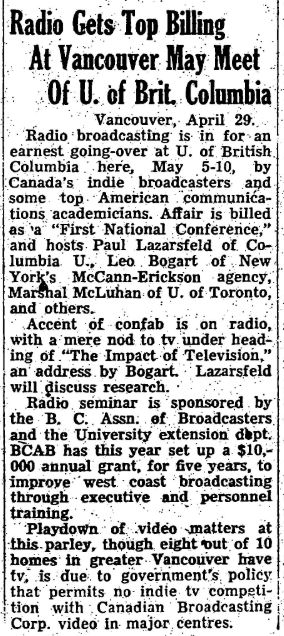McLuhan participated in a ‘Communications Programme’ at UBC in 1958 and in 1959. In May 1958 he delivered the keynote address at a conference sponsored by the programme on ‘Radio in the Future of Canada’. In the summer of 1959, he led an extended ‘Communications Seminar’ there.
Aside from McLuhan, the 1958 programme included Wilbur Schramm from Stanford, Paul Lazarsfeld from Columbia, and the participation of national and international advertising agencies, Cockfield-Brown (Toronto) and Foote Cone & Belding (New York). The NAEB supplied some materials and local and national broadcasters were involved both in funding the programme and participating in it. The following notice appeared in Variety (April 29, 1958, p47):
This was a critical time in McLuhan’s career when the foundations for “Understanding Media” were being laid. It was in 1958 that he began work with the NAEB and in 1959 he was already at work on the research project with the NAEB that would be published the next year as a ‘report on new media’. With this report, the parameters were set for McLuhan’s work over the remaining 20 years of his life.
In his President’s Report for 1959, Norman MacKenzie described this UBC programme as follows:
Communications Programme
ALTHOUGH IT SEEMS INEVITABLE that the major means of communication between scholars will remain human contacts, books and journals, it may well be that communication between scholars and the general public will take other forms. Believing that popularization is important and that the newer media of radio and television are worth studying in themselves, the University was happy to begin in 1957 an experimental communications programme, financed by a grant from the B.C. Association of Broadcasters.
The grant was intended to enable the University to investigate its own role in the field of broadcasting and, more particularly, to explore means by which those in the broadcasting industry could improve their services to the public. Initially the programme had three objectives: (a) To provide a regular series of night classes, conferences, short courses and seminars for broadcasting personnel in British Columbia; (b) to develop the facilities of the University for working in all kinds of mass communications; (c) to begin work in such areas as audience research, media studies, and the communication of the fine arts.
The whole programme was designed with one principle in mind, that the handling of the technical means of broadcasting such as television cameras, broadcasting schedules, film production, etc., should not become separated from the more theoretical kinds of investigation.
Under the programme, we have organized a considerable number of lecture series, seminars, etc. The following is a representative rather than a complete list, but it does give some idea of the scope of our activities and the degree to which we have been able to work with various university departments on the one hand and the broadcasting industry on the other.
Courses
Introduction to Television — Mr. James Patterson (CBC)
Film Production — Mr. Robin Pearce (UBC Extension)
Speech for Broadcasting — Dr. P. Read Campbell (UBC Faculty of Education)
Introduction to Radio — Mr. John Ansell (CKWX)
Research Methods and Measurement — Dr. D. T. Kenney (UBC Psychology)
Commercial Writing for Broadcasting — Mr. Sam Fogel (Cockfield-Brown [Advertising Agency])
News for Broadcasting — Mr. Dorwin Baird
Summer School, 1959
Communications Seminar — Dr. Marshal McLuhan, Department of English, St. Michael’s College, University of Toronto
Speech for Broadcasting — Dr. P. Read Campbell
Film Production — Mr. Ronald Kelly
Conferences and Short Courses
Radio in the Future of Canada — Financed by the grant previously mentioned and the Koerner Foundation, the Conference was attended by representatives of the CBC, BBC, American broadcasting agencies and Canadian private stations.
Short Course on Communications — Conducted by Dr. W. S. Schramm, Director of the Institute of Communications Research, Stanford University; Mr. Albert Shea, Canadian Research Agency, Toronto; and Mr. Gene Duckwall, Foote Cone Belding, Los Angeles.
In cooperation with the Extension Department and with other departments in the University, we have provided a series of lectures on the CBC and have helped private stations use material prepared by the National Association of Educational Broadcasters.
(…)
The University continues to take a serious interest in broadcasting, in view of the profound influence it has on our lives and society. We hope that U.B.C. can become a major centre for the study of communications. Already we have learned much about the history and operation of broadcasting in Canada and have developed with members of the industry relationships which we expect to be profitable both to them and to us.
